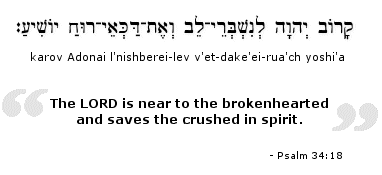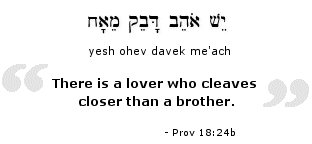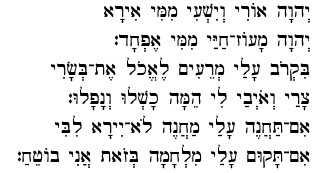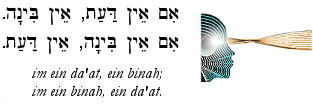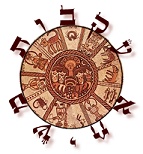|
|
|||||||||||||||||||||
 |
|||||||||||||||||||||
|
Learn Hebrew |
|||||||||||||||||||||
 |
|||||||||||||||||||||
|
Learn Torah |
|||||||||||||||||||||
|
November 2007 Updates I also added additional drash to Psalm 4 today as well. You might need to press F5 (refresh) to see the changes. Shabbat Shalom! Psalm 4 in Hebrew 11.29.07 I have begun adding the Hebrew text (with audio and commentary on each pasuk) to Psalm 4 on the site... 
Psalm 3 in Hebrew 11.28.07 I updated the rest of Psalm 3 in Hebrew. This is a wonderful psalm that tells of the LORD as sar yeshuah - the captain of salvation. Even in the midst of the hard circumstances of his son Absalom's rebellion (and Israel's mutiny), David banished fear and trusted in the salvation of the LORD. 
New Hebrew Meditation on Isaiah 9:6-7 11.27.07 Since many Christians will soon be celebrating Christmas, I wrote a new Hebrew mediation (The Promised Child and Son) that considers a verse commonly invoked during many Christmas ceremonies, namely, Isaiah 9:6-7: Unto us a child is born, unto us a son is given, and the government shall be upon his shoulder, and his name shall be called Wonderful Counselor, Mighty God, Everlasting Father, Prince of Peace. Of the increase of his government and of peace there will be no end, on the throne of David and over his kingdom, to establish it and to uphold it with justice and with righteousness from this time forth and forevermore. The zeal of the LORD of hosts will do this. Many Christians regard this verse as being fulfilled in Jesus, and while this is ultimately true, we need to be careful to make certain qualifications when we affirm this. Some Christian theologies teach that when Jesus ascended to the right hand of God (after His resurrection), He also sat down on the throne of David, and they therefore conclude that the Davidic kingdom has been inaugurated. An implication of this is that the Church is now "spiritual Israel," a spiritual kingdom on earth. But note that Isaiah's prophecy of this promised son says (v7): "Of the increase of his government and of peace there will be no end, on the throne of David and over his kingdom, to establish it and to uphold it with justice and with righteousness from this time forth and forevermore." Behold, the days are coming, declares the LORD, when I will make a new covenant with the house of Israel and the house of Judah, not like the covenant that I made with their fathers on the day when I took them by the hand to bring them out of the land of Egypt, my covenant that they broke, though I was their husband, declares the LORD. But this is the covenant that I will make with the house of Israel after those days, declares the LORD: I will put my law within them, and I will write it on their hearts. And I will be their God, and they shall be my people. And no longer shall each one teach his neighbor and each his brother, saying, 'Know the LORD,' for they shall all know me, from the least of them to the greatest, declares the LORD. For I will forgive their iniquity, and I will remember their sin no more." I have written about this topic before, but suffice it to say here that it is my settled conviction that God has not forsaken the Jewish people, even though there is a "partial hardening" of their hearts until the fulness of the Gentiles is complete (see Romans 11 for the details). Israel indeed has a future and a New Covenant hope, and while Isaiah 9:6-7 gloriously applies to Jesus, the promise has its ultimate fulfillment upon His return to Jerusalem to establish the Messianic Kingdom of God on the earth (Jer. 23:5-6, 33:15; Ezekiel 47:13-48:29, Ezekiel 48:30-35; Acts 1:6-8; Acts 15:14-17, etc.). Like many of the promises we treasure in Scripture, this one too has an "already-not-yet" status...
Parashat Vayeshev and the Suffering Servant 11.26.07 I updated the weekly Torah portion for this coming Shabbat (Vayeshev) and created a PDF file download.  This week's parashah begins with Jacob finally settling in the land promised to Abraham and Isaac with his 12 sons, but quickly turns to the story of Jacob's favorite son Joseph, who was 17 years old at the time. Joseph is a picture of Yeshua (Jesus) as Mashiach ben Yosef (Messiah son of Joseph) regarding His first advent as our Suffering Servant. The analogue between Joseph and Yeshua is rich indeed.
Mizmor Gimmel 11.24.07 I am working on adding Psalm 3 in Hebrew to the site. I added a number of comments to the first four pesukim (verses) late this evening. I am still in pain and having trouble sleeping; the Psalms give me great comfort. 
Happy Thanksgiving! 11.21.07 Our sincerest wish and prayer for you - to have a joy-filled time of reflection during the Thanksgiving Holiday, taking care to enumerate the many blessings that the LORD God of Israel has bestowed upon you. A basic principle in Bible interpretation is to note repeated occurrences of a word or phrase. This is sometimes referred to as the "law of recurrence." The assumption here is that since God is the Consummate Communicator, if a word or phrase is restated in Scripture, there is surely a good reason. In some cases the function appears to be didactic (such as the two sets of instructions given for building the Mishkan (tabernacle) in Exodus; in other cases it appears to be exclamatory: God doesn't repeat Himself without the intent of getting our attention.
Note: Chanukah begins Tuesday, December 4th (at sundown) this year! 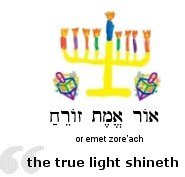 Another Kierkegaard Article 11.20.07 Probably no modern Christian thinker has affected me more than Soren Kierkegaard (1813-1855). Today I added an excerpt from his work "The Sickness Unto Death" that provides an incisive analysis of the modes or ways we choose to embrace our existence. Although it's not "light" reading, it is certainly worth the effort to understand Kierkegaard's thought (the translation (from the Danish) by C.E. Moore is especially easy for modern English speakers). We all stand at the "crossroads" of the eternal and the temporal, and we can only know ourselves for what we are when we surrender to God for each irrepeatable choice of our lives.  If you are troubled, remember: Ki yesh tikvah... Parashat Vayishlach - Wrestling with God 11.19.07 I updated the weekly Torah portion for this coming Shabbat (Vayishlach).  This portion includes the story of how Jacob, as he was returning to his home town of Chevron after fleeing from his uncle Laban, encountered the Angel of the LORD and "wrestled" with Him. During the "grappling" the Angel injured Jacob's thigh, but Jacob refused to release his hold until the Angel blessed him. The Angel then asked him, "What is your name?" And he said, "Jacob" (Ya'akov). The Angel then declared to him, "Your name shall no longer be Ya'akov ("heel holder" [of Esau]) but Yisrael ("contender with God"), for as a prince (sar) you have striven (sarita) with God and with men and have prevailed" (Gen. 32:28). Notice that after Jacob encountered God and wrestled with him, he was wounded so that he walked with a limp... And so it is with the walk of faith. Who among us has not been broken before coming to know the LORD? As Tozer reminds us, "It is doubtful whether God can bless a man greatly until he has hurt him deeply." Beauty for ashes, chaverim....
I should add something here.
More Hebrew Psalms! 11.16.07 I revised Psalm 1 by adding additional notes for each pasuk (verse). This is a great psalm, and I encourage you to study it with zerizut (zeal, passion). Shabbat Shalom, chaverim. 11.16.07 I have added some additional Psalms to the new Hebrew Psalms pages. Please note that this is a work in progress: I am simply trying to get the Hebrew text in place (as well as creating the audio files); I am not including commentary on the individual Psalms at this point (though I hope to do so later). I hope these pages will be helpful to those of you who are studying Hebrew or who wish to practice your reading skills. 
New Section on Hebrew Psalms 11.15.07 I am still in a lot of pain, but I managed to add Psalm 2 (and part of Psalm 3 and Psalm 27) to the new Hebrew Psalms pages. I will add additional Psalms as I find the time, b'ezrat HaShem. I also have been adding a considerable number of new Hebrew words to the Glossary Pages.  Note: Chanukah begins on December 4th this year!
Anti-War but Pro Israel? Huh?  11.14.07 It's always risky discussing politics, especially in this umbrageous day and age, but recently someone asked me how I could support someone like Dr. Ron Paul when he doesn't support Israel financially or militarily. My short response was that while I love Israel and emphatically believe in her future, I certainly don't think that she needs America to defend her. No indeed: Israel's defense comes from the LORD God of Israel Himself. It's His land, after all, and His promises are sure:
ki-li ha-artez ki-gerim v'toshavim atem The political problems we are seeing today (including the ill-omened Annapolis "peace talks") are the result of secular governments and their schemes (such as the Olmert and Bush administrations as well as various factions of militant Islam). God Almighty has no problem defending His land -- and it behooves us to remember that He counts the chariots of men as less than nothing:
kol-ha-goyim k'ayin negdo All the nations are as nothing before him, It seems to me that, as followers of Yeshua, we should take rather seriously His commandment to love our enemies and to pray for those who persecute us (Matt 5:44). The very life of Yeshua during His advent as Mashiach ben Yosef demonstrates this principle (Isa 53:7; John 19:9-11; Matt. 16:21; Luke 9:22; John 13:34-5; Rom. 13:8; 1 Peter 2:23; 1 Thess. 5:15; 1 John 3:11; 3 John 1:11). There is nothing more powerful than love, and no evil can truly befall the tzaddik whom the LORD loves.
Adonai ori v'yishi, mimi ira? The LORD is my light and my salvation; whom shall I fear? As James the Righteous said, "From whence come wars and fightings among you? come they not hence, even of your lusts that war in your members?" (James 4:1). The horrors of modern day warfare, especially as they are waged by secular and godless governments, are a sacrilege to the love and grace of God as revealed in Yeshua. The primary reason human beings tend to rely on such carnal weapons of warfare is because they are devoid of real faith that God is there and will vanquish the enemy on their behalf. We must remember that God has "no cause" of which we can be a part -- except that of surrendering our lives to the truth of His love.
ki la-Adonai hamilchamah
Ka'as and Yissurim... 11.13.07 Someone wrote me today and asked how I was doing. That's an awkward question to field, since I want to be honest about my yissurim (suffering) without falling into self-pity. On the one hand I am really hurting. The pain is unrelenting and searing... It's especially tough because I have no sick time left at my job and therefore I have to sit with ice packs on my shoulder/neck at work. The pain makes working difficult; almost every word I type hurts. Sleep is difficult, too. On the other hand, it certainly could be worse. I understand there are many people all over the world who are in a state of pain worse than mine, not to mention the greater tza'ar ba'elei chayim - the pain of all living creatures. At any rate, I do need to "kvetch" about something.... I often wonder why Exodus 20:15 is so difficult for some people to understand? Today I happened upon a web site (a Messianic Ministry I will leave unnamed) that blatantly copied off my work and presented it as their own. This sort of thing gets me very angry, for a variety of reasons, and demotivates me to continue this work. Yid mit Tzuris.
Alas, it is the "flesh" within me, surely not the Spirit of our LORD, that is agitated by all this. If I were more like our beloved Yeshua, I would not mind in the least, since He always gave freely and never complained... May it please God to help me let go.
Parashat Vayetzei 11.12.07 I updated the Torah portion for this coming Shabbat (Vayetzei) and also added some additional entries to the Hebrew Glossary pages.  This marvellous parasha includes Jacob's famous dream of a ladder set on the earth that reached to the heavens (sullam). Yeshua (Jesus) spoke of this ladder in John 1:51. Just as Jacob saw the ladder ascending to heaven with the angels of God ascending and descending upon it, so Yeshua tells Nathanael that He is the very Ladder to God, the true sha'ar hashamayim - the Way into heaven (John 14:6). Living in American Babylon... 11.9.07 Today I read an article by Hal Lindsey that pointed out the following:
None of these things surprises those who've been following the various cultural trends and machinations at work in the world. What is noteworthy, however, is that the "time of reckoning" seems nearly upon us, a time when things will radically change here in the USA. It has become clearer and clearer that the infamous day of September 11, 2001 (i.e., 9-11) marked the beginning of the end for the USA. Everything has unraveled since then. 9-11 was "the" defining moment of the "new age" of terror, with the Twin Towers a sort of "glyph" meant to signal the beginning of global fascist control over all the peoples of the earth. And isn't it surprising that much of the chaos centers on the ancient land of Bavel (i.e., Iraq), the place of the original migdal-Bavel - the Tower of Babel? Migdal Bavel was a tall, fortified tower (ziggurat) that gave the illusion that "the power of the gods" was on their side. It represented a place "to make a name" and to demonstrate human power. In sort, migdal Bavel has become a symbol of proud humanism and the attempted apotheosis (deification) of human beings. The time immediately before the appearance of the Messiah is called ikvot Meshicha, the "footsteps of the Messiah" (a term taken from Psalm 89:51). According to traditional Jewish sources (Pesachim 54b; Midrash Tehilim 9:2), no one knows the time when the Messiah will appear. This accords with the teachings of Jesus and His apostolic witnesses (Matt. 24:36-44; 1 Thess 5:1-3; 2 Pet. 3:10; Rev. 3:3). The condition of the world during acharit hayamim (the end of days) will be grossly evil (2 Pet. 3:3; 2 Thess. 2:3-4, 2 Tim. 3:1-5). The world will undergo various forms of tribulation, called chevlei Mashiach - the birth pangs of Mashiach (Sanhedrin 98a; Bereshit Rabba 42:4, Matt. 24:8). The Zohar (Zohar II:8a) notes that during this time there will be prosperity, technological discoveries and advances, propagation of mystical teachings, and many signs and miracles. This also accords with the teachings of the Brit Chadashah (i.e., the Olivet Discourse of Matt. 24-25). For people who speak thus make it clear that they are seeking a homeland. If they had been thinking of that land from which they had gone out, they would have had opportunity to return. But as it is, they desire a better country, that is, a heavenly one. Therefore God is not ashamed to be called their God, for he has prepared for them a city. (Hebrews 11:14-16) As you consider these things, call upon the LORD and ask Him to help you be ready for the days to come... He will never leave nor forsake us (Hebrews 13:5). 11.7.07 I added another 30 or so Hebrew words to the Hebrew Glossary pages today. I'm still in a state of yisurim (suffering), but working on the site helps me focus on things other than pain. Your tehillim for my refuah shleimah are deeply appreciated, chaverim.
Are you one of the "Unchosen Chosen"? 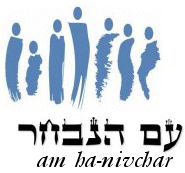 11.6.07 Within the Messianic movement, some non-Jewish Christians tend to consider themselves as "second-class" members in the family of God. They often tend to be self-deprecatory, calling themselves "wild olive shoots," "Gentile believers," or even "ger tzedek" (a righteous convert). This is most unfortunate, since it robs these precious souls of their true identity as co-heirs of the Kingdom (Gal. 3:9; Titus 3:7), and it also destroys the unity that Jesus sought to bring among God's people (John 17:20-23; Eph. 2:14-15).
Parashat Toldot 11.4.07 I updated the Torah portion for this coming Shabbat (Toldot) and added another 30 or more key words to the Hebrew Glossary pages.  I am still experiencing a lot of pain (despite some medication). I go back to the doctor (again) this coming Tuesday morning. Please accept my thanks and appreciation for your thoughts and prayers for my healing.
Pri Ha-Ruach - The Fruit of Spirit 11.2.07 Traditional Judaism identifies various middot ha-lev (qualities of heart) that attend to a genuinely Jewish life. These include Talmud Torah (studying Scripture), ahavat Adonai (loving God), gemilut chasidim (doing works of righteousness), bikkur cholim (visiting the sick), and so on. The follower of Yeshua (Jesus) likewise must evidence middot hav-lev, though the Source for such comes directly from the power of the Ruach Ha-Kodesh (Holy Spirit) working within the heart of faith. The priot (fruits) listed in Galatians 5:22-23 represent nine visible attributes of a true follower of Yeshua (Jesus): 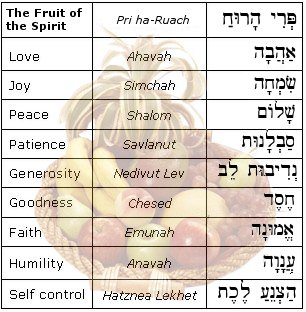 Note that these priot are not obtained through self-effort or various attempts at human reformation, but rather are a supernatural outgrowth of the grace and love of God in the life of one who puts their trust in Yeshua as Mashiach. See John 15:1-8. Our lives are sanctified in the manner in which they were initially justified: wholly by faith in the love and grace of God...
The Three Pillars When considering the various middot ha-lev (qualities of heart), a well-known maxim (given in Pirkei Avot 1:2) suggests that the spiritual life must be understood as a three-part balancing act:
Like a chair that requires at least three legs to function, so we must 1) engage in the study of Scripture, 2) serve the LORD with passion, and 3) truly love another. Please note that each of these "pillars" is stated in the teachings of the Brit Chadashah (e.g., study: Acts 17:11, 2 Tim 2:15); serve God: Matt. 4:10, Matt. 6:24, 1 Thess 1:9, 2 Tim 1:3), love one another: John 13:34-5, John 15:17, Rom. 12:10, Rom. 13:8, etc.). May it please the LORD to conform each of us into the "image of His Son" (Rom. 8:29).
Gam Zu l'Tovah 11.1.07 I am in pain again today. It is a struggle to write at all. However, I have taken some time to add new entries to the Hebrew Glossary pages. I hope that learning these words/phrases will enrich your Jewish literacy. Please keep me in your prayers, chaverim. I went to the doctor today and will see a physical therapist next week. I don't like taking medicine, but the pain is unrelenting and highly distracting. Thank you.
|
||||||||||||||||||||||||||||||||||||
|
Hebrew for Christians |
||||||||||||||||||||||||||||||||||||
|
||||||||||||||||||||||||||||||||||||







